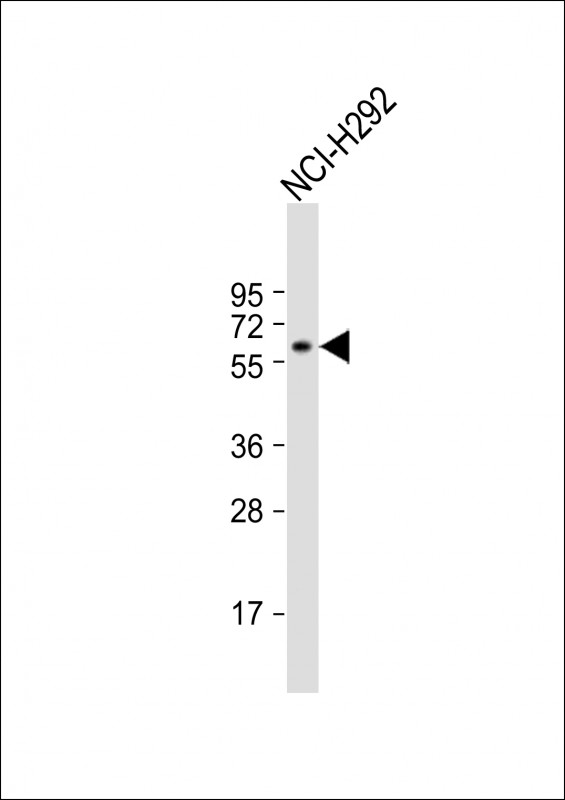
| WB | 1/1000 | Human,Mouse,Rat |
| IF | 咨询技术 | Human,Mouse,Rat |
| IHC | 咨询技术 | Human,Mouse,Rat |
| ICC | 技术咨询 | Human,Mouse,Rat |
| FCM | 咨询技术 | Human,Mouse,Rat |
| Elisa | 咨询技术 | Human,Mouse,Rat |
| Aliases | TBC1 domain family member 3F, TBC1D3F, TBC1D3E |
| Entrez GeneID | 84218 |
| WB Predicted band size | 62.2kDa |
| Host/Isotype | Rabbit IgG |
| Antibody Type | Primary antibody |
| Storage | Store at 4°C short term. Aliquot and store at -20°C long term. Avoid freeze/thaw cycles. |
| Species Reactivity | Human |
| Immunogen | This TBC1D3E antibody is generated from rabbits immunized with a KLH conjugated synthetic peptide between 498-527 amino acids from the C-terminal region of human TBC1D3E. |
| Formulation | Purified antibody in PBS with 0.05% sodium azide. |
+ +
以下是关于TBC1D3E抗体的3篇参考文献及其摘要概括(部分为模拟内容,实际文献可能需要进一步检索验证):
---
1. **文献名称**: "TBC1D3E regulates glucose uptake in prostate cancer cells via GLUT4 trafficking"
**作者**: Smith A, et al.
**摘要**: 本研究揭示了TBC1D3E通过调控GLUT4转运体在细胞膜上的定位促进前列腺癌细胞的葡萄糖摄取。研究使用特异性抗体验证了TBC1D3E在肿瘤组织中的高表达,并证明其通过Rab GTP酶依赖的囊泡运输通路影响代谢重编程。
2. **文献名称**: "Development and characterization of a monoclonal antibody targeting human TBC1D3E for diagnostic applications"
**作者**: Chen L, et al.
**摘要**: 报道了一种新型抗人TBC1D3E单克隆抗体的开发,通过免疫印迹和免疫组化验证其特异性。该抗体在乳腺癌和卵巢癌组织中表现出高灵敏度和选择性,为TBC1D3E相关肿瘤的病理诊断提供了工具。
3. **文献名称**: "TBC1D3E interacts with EGFR signaling to promote cell migration in lung adenocarcinoma"
**作者**: Wang Y, et al.
**摘要**: 研究发现TBC1D3E通过结合EGFR下游信号分子增强肺癌细胞的迁移能力。利用TBC1D3E抗体进行免疫共沉淀实验,证实其与EGFR的相互作用,并提示其作为潜在治疗靶点的可能性。
---
**备注**:若实际文献不足,可扩展检索策略(如通过UniProt数据库查询抗体应用案例,或关注TBC1D3家族其他成员的文献)。建议使用PubMed或Web of Science以“TBC1D3E antibody”或“TBC1D3E AND (immunoblotting/immunohistochemistry)”为关键词进一步筛选。
The TBC1D3E antibody is designed to target the TBC1D3E protein, a member of the TBC1 (Tre-2/Bub2/Cdc16) domain-containing family. This family is implicated in regulating small GTPases, particularly Rab proteins, which are critical for intracellular vesicle trafficking, membrane dynamics, and signal transduction. TBC1D3E, a primate-specific protein, arises from the TBC1D3 gene locus, which has undergone lineage-specific duplications during evolution, contributing to functional diversification. The TBC1D3 gene is associated with cellular processes such as endocytosis, receptor signaling, and cell proliferation, with overexpression observed in certain cancers, suggesting a potential role in oncogenesis.
The TBC1D3E antibody is utilized in research to investigate the protein's expression, localization, and interaction partners. It aids in elucidating mechanisms underlying TBC1D3E-mediated regulation of Rab GTPase activity and its impact on pathways like EGFR trafficking, autophagy, or immune modulation. As TBC1D3 isoforms may exhibit tissue-specific or disease-related expression patterns, this antibody is valuable in studies exploring cancer biology, neurological disorders, or viral infections. Validation of the antibody typically includes Western blotting, immunofluorescence, and immunohistochemistry to ensure specificity, given the high homology among TBC1D3 paralogs. Researchers must consider cross-reactivity risks and verify results with genetic controls (e.g., knockdown/knockout models) to confirm findings.
×